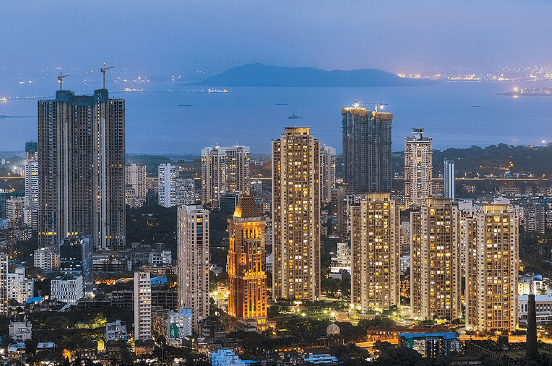Buying a residential property in India is a life-changing investment. Real estate makes a good investment choice in India as its demand always remains high. Some of the benefits of investing in residential property in India include:
- Its valuation appreciates in the long run
- It can help you generate passive income and gives you consistent cash flow.
- It is a safe investment choice.
- It gives you a decent ROI (Return on Investment).
- It offers tax benefits under section 80C.
Evidently, a recent article published online states how property assessment registration records in Mumbai reported a total of 8,871 property conveyance deeds in January 2023 – a clear reflection of the rising housing demand in the country, more than ever.
So, if you want to know what you should consider while buying a residential real estate property in India, this article is for you.
Things To Consider While Buying A Residential Property In India
For instance, if you want to buy a property in Mumbai. Here is a list of things you need to know other than the property prices in Mumbai:
- Budget
- Developer/Builder’s reputation
- Neighbourhood and location of the property
- Quality of construction
- Carpet area of the residential property
- Connectivity and accessibility to the major points
- Resale and rental value of the property
- Additional expenses
Let us talk about each of them in detail.
Budget
Say you found a property in Mumbai that ticks off all your requirements. But when you sit to finalise it, you realise it is not in your budget anymore. Hence, fix a budget after evaluating all your financial liabilities. It will give you clarity on how much you can pay comfortably. Use a property valuation tool like Clicworth to get the market valuation of your property.
Developer’s Reputation
Research the profile of the developer before you buy a property from them. Check the details of the developer on their website, the projects they were involved in, and the reviews they received from their past clients. Look for their current projects under construction and discover their credibility.
Neighbourhood And Location Of The Property
Check everything about the location of the property and its neighbourhood. You need good neighbours and schools, banks, hospitals, and grocery shops within reach. You may like a property, and it can be a lonely area. It may make you feel unsafe.
Sometimes developers may quote a higher price, so do not fall for the gimmick. Whether you buy a property in Mumbai or anywhere in India, check the property prices on a trusted online real estate platform.
Quality of Construction
Check the quality of home construction and small details such as:
- Type of flooring
- Colours
- Bathroom fittings
- Window frames
- Strength of walls
Let’s say you found a property in Mumbai whose price fits your budget. If the quality of construction is not good, you will find it difficult to live there comfortably. Hence, consider visiting a property constructed by the developer to get an idea of their construction quality and style.
Carpet Area Of The Residential Property
Check the dimensions of the following in the construction plan to figure out the area you will be getting to use:
- Living room
- Bedroom
- Kitchen
- Balcony
Builders may include the construction cost of elevator space, wall thickness, staircase, lobby, and shafts in the price. Beware that you do not pay more than the market price per square foot for the property.
Connectivity And Accessibility To Major Points
See how far the property is from your office and what transportation facilities are available nearby. Check for any express highways and bus stops near the property too.
Let’s say the property you like in Mumbai is in an area that is scenic but not close to your workplace. It can become a hustle. It might end up hampering your personal and professional life. Hence, look for a property that saves your travel time apart from property prices in Mumbai.
Resale And Rental Value Of The Property
Account for the current rental value and the resale value of the property whether you resale it or live in it. Consider the future gains you will reap out of the property and acquire complete knowledge of the location of the property. Inspect current infrastructure and future development plans. Your return on investment also depends on the ease with which you access schools, malls, and hospitals.
Additional Expenses
Make sure to read all the clauses, penalties, and implications. Calculate all the additional expenses like home loan processing charges, registration fees, and GST. Check with the developer for the delivery date. Look out for hidden charges, if any, that you didn’t know about during the deal. Once you verify all these details, you can sign the final agreement. Do not hesitate to compare other properties with yours to see if you get a better deal elsewhere.
Now that you know what you need to know while buying a residential property in India, let us also find out what you need to do.
Documents You Must Keep Handy While Buying A Residential Property In India
Once you decide to buy a property, keep this property documentation checklist handy. Here are the pieces of documents you need to collect as a buyer of the property:
- Sales Deed
- Allotment letter
- Khata certificate
- Possession letter
- Payment receipt
- NOC (No Objection Certificate)
- General Power of Attorney
- Rectification Deed
- Building plan’s copy
- Occupancy certificate
- Encumbrance certificate
- Completion certificate
- Joint development agreement
- Mutation register records
Final Word
Buying a real estate property in India requires proper planning. It will be a valuable asset for life long. Hence, an extensive checklist will help you consider the right things before you invest in any residential property. It involves a lot of steps and research and requires you to read between the lines. Whether it is additional expenses or the developer’s reputation, make sure you know all the inside details.
After all, you are investing a lot of money, so why not ensure you are not overspending or overlooking any tiny details, right?






